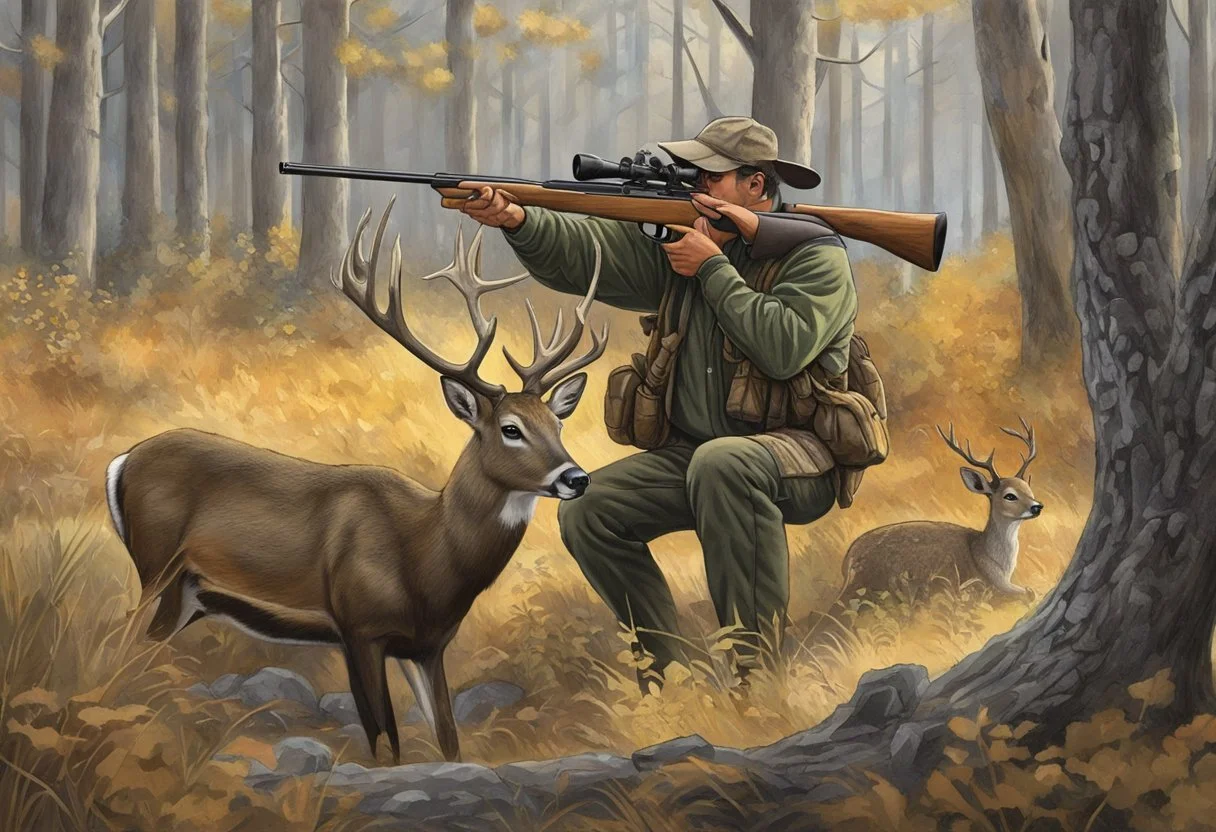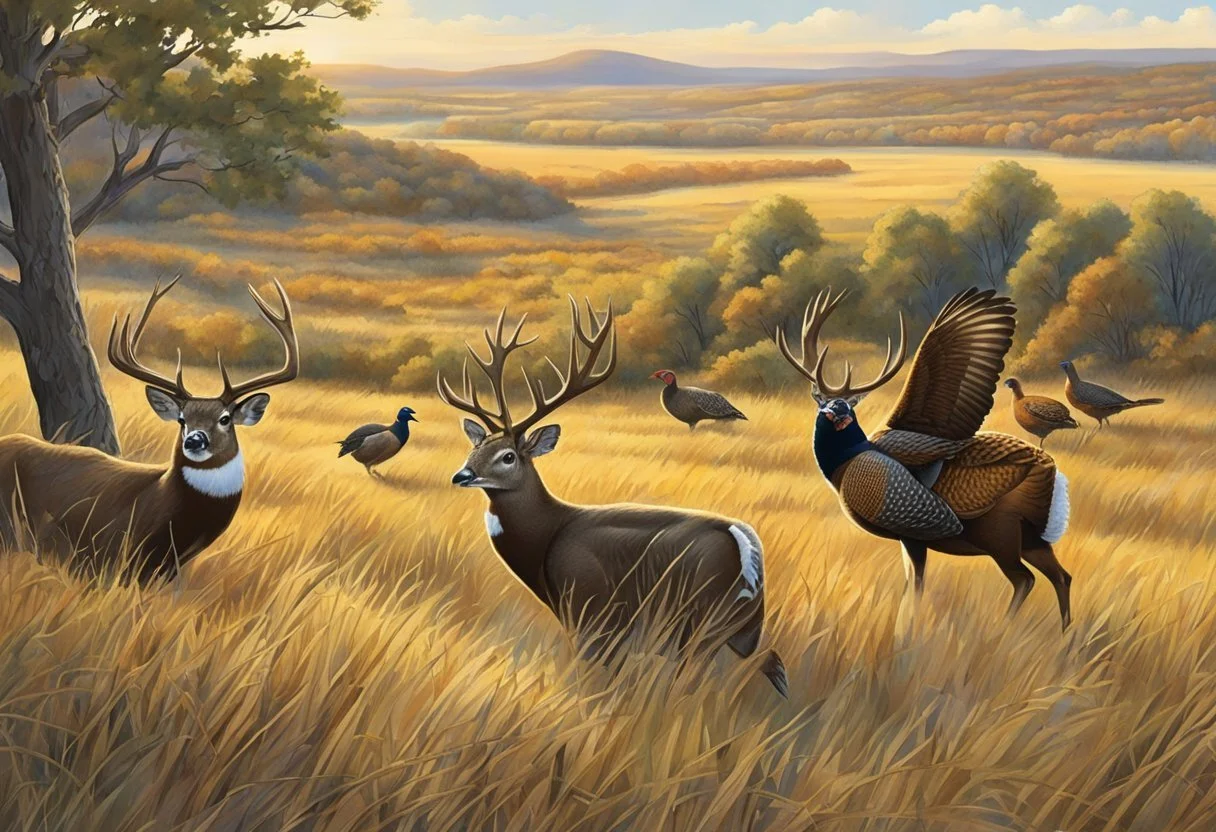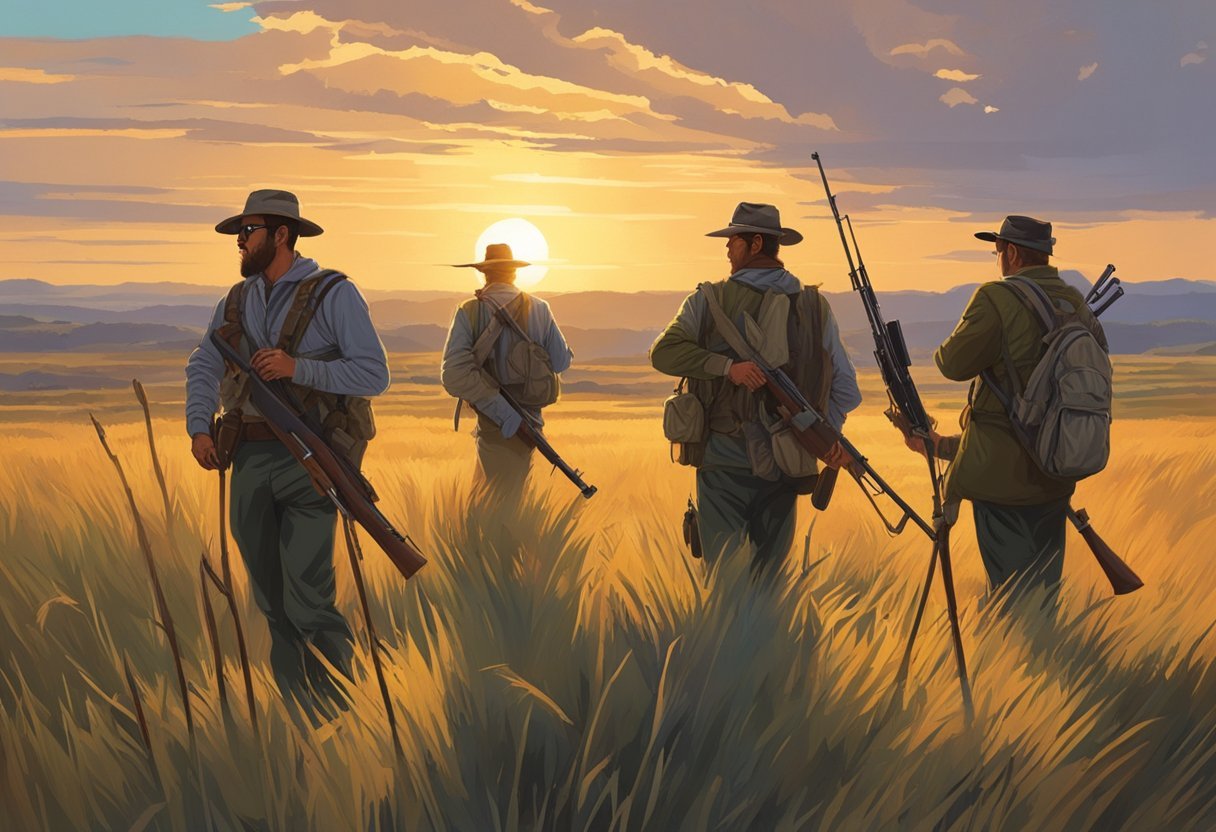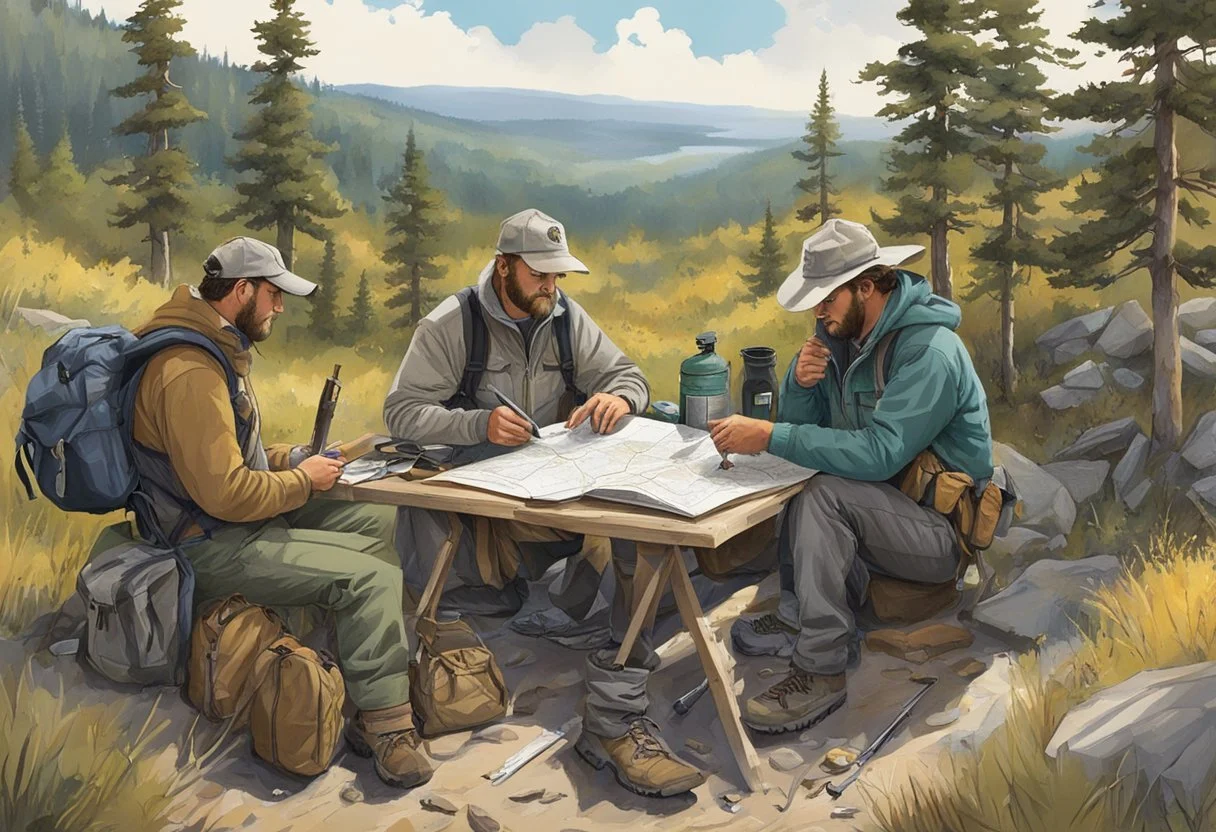Your Guide to Hunting in Nebraska
Essential Tips and Guides
This Article is Part of Our Hunting Guide for All 50 US-States
Hunting in Nebraska offers a diverse and exciting experience for those new to the sport. With its vast landscapes and abundant wildlife, the state provides a perfect backdrop for beginners eager to learn about and participate in this amazing outdoor activity. From big game to small game and waterfowl, there is a wide array of hunting opportunities available, suiting the interests and skill levels of any beginner hunter.
As a beginner, it is essential to familiarize yourself with Nebraska's hunting regulations, seasons, and licensing requirements. The state's Game and Parks Commission provides all the necessary information and resources to ensure a safe and successful hunting experience. Beginner hunters are advised to take a hunter education course as it teaches important safety guidelines, hunting ethics, and proper handling of hunting equipment.
Beyond learning the basics, teaming up with experienced hunters and joining local hunting communities can make a significant difference in one's early hunting endeavors. These seasoned hunters can provide invaluable advice, guidance, and mentorship, allowing beginners to develop their skills in a supportive and educational environment. As a novice hunter in Nebraska, embracing these opportunities will pave the way to a rewarding and enjoyable journey in the great outdoors.
Understanding the Basics of Hunting
Hunting Education and Safety
Before embarking on a hunting trip in Nebraska, it is crucial for beginners to prioritize safety and education. To become a responsible hunter, one must first complete a Hunter Education Course. These courses cover topics such as firearm safety, ethics, and conservation principles. In Nebraska, hunters aged 12 and older are required to complete a hunter education course.
In addition to the course, beginners should familiarize themselves with safe hunting practices. Essential equipment includes blaze orange clothing for increased visibility and proper ear protection. It is also crucial to maintain the proper handling and storage of firearms.
Hunting Seasons and Species
Understanding the hunting seasons and available game species is another fundamental aspect of hunting in Nebraska. Game species can be categorized as follows:
Hunting seasons vary for each species, so it is essential to consult the current Nebraska Hunting Guide for specific information on season dates and bag limits.
Regulations and Permits
Hunting in Nebraska entails adhering to numerous rules, regulations, and permit requirements. Here are a few key aspects to consider:
Acquire the appropriate licenses and permits: Before hitting the hunting grounds, ensure you have the necessary permits, such as a hunting license, habitat stamp, and species-specific permits (e.g., deer or turkey permits).
Know the hunting zones: Nebraska is divided into several hunting zones, with regulations tailored to each zone. Take note of zone-specific rules, such as bag limits and season dates.
Respect private property: Always obtain permission from landowners before hunting on private land, and follow the Leave No Trace principles in order to help maintain goodwill and promote responsible hunting practices.
Following these guidelines while keeping safety, education, and ethical behavior in mind will ensure a fulfilling and enjoyable hunting experience for beginners in Nebraska.
Getting Started in Nebraska
State Requirements for Beginners
Before you begin your hunting journey in Nebraska, it's essential to understand the state requirements. All hunters born on or after January 1, 1977, must complete a Hunter Education course to be eligible for a hunting permit. The minimum age to take the course is 11, and permits are issued upon turning age 12.
In addition to the hunter education, beginners should acquire a hunting permit. The permits are categorized as follows:
Resident Annual: Available to Nebraska residents only
Nonresident Annual: Available to non-Nebraska residents
Youth Annual: For those under the age of 16 (resident and nonresident)
To further clarify the permit requirements, an easy-to-read table is provided below:
Permit Type Resident Nonresident Youth (Under 16) Annual Yes No No Nonresident Annual No Yes No Youth Annual Yes Yes Yes
Keep in mind that additional permits, stamps, or tags may be required depending on the game species you plan to hunt.
Learning to Hunt Programs
For those new to hunting in Nebraska, the state offers Learn to Hunt programs tailored for beginners. These programs provide hands-on experience and guidance from seasoned hunters to help you gain the skills and knowledge you need to succeed.
Some popular Learn to Hunt programs include:
Mentored Youth Hunts: Targeted at youth ages 12-15 who have completed hunter education and possess a valid hunting permit.
Adult Learn to Hunt Workshops: Aimed at beginner adults who are interested in hunting but have little to no experience.
Family Field Days: Focused on providing families with a fun and educational hunting experience.
Participating in these programs will boost your confidence and hunting skills, preparing you for a successful and enjoyable hunting adventure in Nebraska. Remember to always follow safety guidelines, adhere to state regulations, and treat the land and wildlife with respect. Happy hunting!
Hunting Equipment Essentials
Choosing the Right Gear
When embarking on a hunting adventure in Nebraska, it is crucial to have the appropriate equipment for a safe and successful experience. The following list highlights key items to consider:
Appropriate clothing: Choose clothing that provides protection from the elements and allows for easy movement. Select camouflage or neutral-colored clothing based on the terrain.
Footwear: Invest in comfortable, waterproof, and durable boots to navigate various terrains and weather conditions.
Backpack: A lightweight and roomy backpack with multiple compartments will help keep your hunting gear organized.
Navigation tools: Equip yourself with reliable tools such as a compass and a topographical map or a GPS device for accurate navigation.
First-aid kit: Ensure to have a well-stocked first-aid kit on hand to address any injuries or medical emergencies that may arise.
Firearm and Archery Advice
Choosing between firearms and archery equipment depends on personal preference, skill level, and the type of game being hunted.
Firearms:
Rifle: A versatile choice for hunting various game types, rifles offer a range of calibers suited for different environments. Beginners should consider one with a lighter recoil for better accuracy and control.
Shotgun: Ideal for hunting birds and small game, shotguns are user-friendly and can be easily adapted to different hunting scenarios with various ammunition types.
Handgun: Not recommended for new hunters, handguns require advanced shooting skills and accuracy.
Before purchasing a firearm, make sure to have the required licenses and permits in place. Additionally, enroll in a firearm safety course to acquire proper handling and shooting skills.
Archery:
Compound bow: A popular choice for beginners, compound bows have a mechanical system that reduces the effort needed to hold and aim, providing higher accuracy.
Recurve bow: With less assistance from mechanical systems, recurve bows require more physical strength and practice but offer a traditional and satisfying hunting experience.
Crossbow: Suitable for those with limitations in arm strength, crossbows are powerful and accurate, but have a slower reload time.
Whichever archery equipment you choose, taking an archery course and practicing regularly will help build your skills and overall success in the field.
Planning Your Hunt
Scouting for Game
To increase your chances of success, it is vital to scout the areas you plan to hunt. Nebraska offers a diverse array of game species, so familiarize yourself with their habitats and habits. Consider the time of year and species-specific patterns to determine when and where you'll likely find your target animals. Monitoring food sources, water sources, and bedding areas can also help you identify the best locations for your hunt. Utilize topographic maps to study the terrain and identify potential travel corridors for animals in the area.
Public Access Areas
Public access to hunting lands in Nebraska includes both state-owned areas and properties enrolled in the Open Fields and Waters (OFW) program. To locate these areas, consult the Public Access Atlas, an annually updated resource provided by the Nebraska Game and Parks Commission. This atlas includes information on the availability of different hunting species, access rules, and any site-specific regulations. Obtain the necessary permits and study the guidelines before venturing out.
Nebraska's Telecheck system provides an easy and convenient method for hunters to report their harvested game. Familiarize yourself with this system to ensure compliance with state laws and contribute to the state's game management efforts.
Utilizing Technology for E-Scouting
Take advantage of modern technology to maximize your scouting efforts. E-scouting refers to the use of various online tools and applications to gather information about hunting locations. Some popular resources for e-scouting include:
Aerial imagery and satellite maps: These tools offer a bird's-eye view of the landscape, allowing you to identify potential hunting spots and plan your approach.
Smartphone apps: Many apps are designed specifically for hunters, providing valuable information on weather, wind direction, and mapping features, including offline options.
Online forums and social media: Networking with other hunters can provide insight into local hunting conditions and tips on productive locations.
By investing time in scouting and leveraging available technology, you can greatly increase your chances of a successful hunt while also ensuring a safe and enjoyable experience in the Nebraska outdoors.
Types of Game in Nebraska
Nebraska offers a variety of hunting opportunities for both experienced and beginner hunters. With a diverse range of game species available, hunters can pursue big game, small game, and upland birds across the state's diverse landscapes. This section will cover the types of game available for hunting in Nebraska, including big game and small game species.
Big Game Hunting
Deer Hunting: Nebraska is well-known for its deer population, particularly white-tailed deer and mule deer. With healthy numbers of both species, hunters can enjoy productive deer hunting seasons. The state has specific seasons for archery, firearm, and muzzleloader hunting to ensure proper management and conservation of the deer populations.
Other Big Game: While deer are the most popular big game species in Nebraska, hunters can also pursue elk, antelope, and bighorn sheep. These species require special permits and have limited hunting seasons to help maintain healthy populations.
Small Game and Bird Hunting
Turkey Hunting: Wild turkeys are abundant in Nebraska, providing hunters with the opportunity to enjoy both spring and fall hunting seasons. Turkey hunting in Nebraska can be very rewarding, given the high success rates and healthy populations of wild turkeys.
Small Game: Nebraska offers various small game hunting opportunities, including squirrels, rabbits, and raccoons. These smaller game species can provide a fun and challenging hunting experience, especially for beginners.
Upland Bird Hunting: Hunters can pursue a variety of upland bird species in Nebraska, such as pheasants, quails, and grouse. The state's diverse habitats are well-suited for upland birds, and public hunting lands are available for those seeking these game birds.
In summary, Nebraska provides an array of game species for hunting enthusiasts, ranging from big game like deer and elk to small game and upland birds. Whether you're a seasoned hunter or just starting, Nebraska's abundant wildlife and varied landscapes make it an attractive destination for all hunting levels.
Best Practices for Hunters
Ethical Hunting
Practicing ethical hunting is an essential responsibility for every hunter. A key tenet of ethical hunting is understanding and following all hunting regulations. Adhering to these rules helps maintain healthy wildlife populations and ensures the future of hunting activities.
When hunting on publicly accessible lands, be aware of the season dates, bag limits, and species allowed in your area. Familiarize yourself with the distinctions between game species and protected species to prevent illegal harvest. Respecting nature, keeping a clean, and a low-impact campsite.
Hunting Safety Tips
Ensuring safe hunting practices is vital for a successful and enjoyable experience. Here are a few essential tips to help keep you safe in the field:
Firearm Safety – Always treat firearms as if they're loaded and keep the muzzle pointed in a safe direction.
Know Your Target – Be confident in identifying your target and what lies beyond it.
Wear Hunter Orange – A high visibility vest or cap will help others recognize you from a distance.
Tree Stand Safety – Use a harness and secure it to the tree before climbing into your stand.
First Aid Kit – Always carry a well-stocked first aid kit with you while hunting.
Landowner Relationships
Maintaining positive landowner relationships is crucial when hunting on private property. Firstly, never access private land without obtaining a landowner permit. This permission must be obtained in writing, as verbal permission is not legally recognized. When hunting on private property, follow these essential guidelines:
Respect the landowner's property by leaving gates as you found them, not littering, and avoiding damaging crops or structures.
Communicate your plans with the landowner, including where you will be hunting and how long you will be on their property.
Offer a small token of gratitude, such as game meat or volunteering to help with chores, to show your appreciation for their generosity.
Following these best practices for hunters in Nebraska will ensure an enjoyable and successful experience for beginners and seasoned hunters alike, while maintaining integrity and safety.
After the Hunt
Checking in Game
After a successful hunt, it is essential for hunters to check in their game. In Nebraska, the Telecheck Program is in place to streamline this process. To comply with regulations, simply call the designated phone number or use the online system to report information about the animal, such as species, sex, and size. This is a crucial step in conservation efforts and population management.
Remember that some hunting areas may require visiting a physical check station. Be sure to verify the specific requirements for the location where the hunt took place. Properly checking in game helps authorities maintain accurate data for future hunting regulations.
Meat Processing and Conservation
Once the game has been checked in, it's time to focus on preserving the meat. Proper meat processing is essential not only for safety and flavor, but also for ethical hunting practices. Start by field dressing the animal to remove internal organs and cool down the carcass.
There are several options for processing the meat:
Do it yourself: This option is ideal for experienced hunters or those willing to learn the necessary skills. There are plenty of resources available to guide you through the process.
Use a local butcher or processor: If you're not comfortable processing the meat yourself or lack the time and equipment, a professional can ensure the job is done correctly.
When preserving meat, consider the following methods:
Freezing: This is the most common method for long-term storage. Ensure the meat is wrapped tightly to prevent freezer burn.
Canning: Pressure canning is a safe way to store cooked meat at room temperature.
Smoking: This method adds flavor and helps preserve the meat by reducing moisture content.
Remember to label and date all packaged meat to keep track of freshness. Properly processed, preserved, and stored game meat can be enjoyed by you and your family for months to come.
Advanced Hunting Strategies
Season and Weather Considerations
When planning a hunting trip in Nebraska, it is crucial to take into account the various hunting seasons and weather conditions. Familiarize yourself with the season dates to ensure compliance with regulations and increase your chances of a successful hunt. Here's a quick reference guide:
Game Species Season Dates Deer September - January Turkey April - May, September - January Waterfowl October - January
Understanding the impact of weather conditions is also essential. For instance, during the late season hunting period, heavy snow can restrict animal movement and make hunting more challenging. However, it can also make tracking your prey more manageable due to the higher visibility of tracks in the snow.
Hunting with Dogs
Incorporating dogs into your hunting strategy can greatly improve your chances of success. Different breeds excel at various tasks, such as tracking, pointing, and retrieving. Some popular hunting dog breeds in Nebraska include:
Labrador Retriever
Pointer
German Shorthaired Pointer
To maximize your effectiveness when hunting with dogs, establish a strong bond and invest time in training. This will ensure optimal communication and understanding between you and your canine companion. Always prioritize your dog's safety and provide proper care during hunts, such as ensuring they stay hydrated and have appropriate protection from cold or wet weather.
Bow Hunting Techniques
Bow hunting offers a unique and rewarding challenge for beginners and experienced hunters alike. When adopting this method, consider the following tips for enhancing your skills and proficiency with a bow:
Select the right equipment: Familiarize yourself with different types of bows, such as compound bows and recurve bows, and choose one that suits your style and experience level.
Practice regularly: Regular practice will hone your skills, improve your accuracy, and boost your confidence in the field.
Maintain your equipment: Regular maintenance, including inspecting and replacing bowstrings, will ensure your gear remains in top condition.
Master stalking techniques: As bow hunting requires closer proximity to your prey, practice the art of stalking to minimize the chances of alerting animals to your presence.
Incorporate these advanced hunting strategies into your Nebraska hunting experience to maximize your chances of success and enjoyment of the great outdoors.
Hunting Opportunities and Education
Youth and Women's Programs
Nebraska offers various youth and women's programs in an effort to involve them in hunting activities. The state has specialized programs, such as Nebraska Outdoors-Woman (BOW), aimed at teaching women various outdoor skills. Additionally, She Goes Outdoors Podcast provides women with valuable tips and expert advice on hunting.
Workshops and Field Courses
Hunting enthusiasts can participate in a variety of workshops and field courses to develop their skills. Nebraska offers hands-on learning experiences for different techniques, such as archery, firearms handling, and game processing. These workshops cater to all skill levels, from beginners to experienced hunters. For a comprehensive listing of workshops, visit learnhunting.org.
Community and Online Resources
Multiple community and online resources are available for hunting aficionados. Online forums and social media platforms offer a wealth of knowledge and networking opportunities with experienced hunters. Listed below are some popular resources:
Local sportsman's clubs
State wildlife agencies
Online forums
Hunting podcasts
Remember, hunting in Nebraska requires proper licensing and adherence to state regulations. Happy hunting!
Hunting in Nebraska's Landscapes
Nebraska offers diverse landscapes and habitats for hunting enthusiasts. This section will focus on two primary locations for hunting in Nebraska: State Wildlife Management Areas and National Forests and Grasslands.
State Wildlife Management Areas
State Wildlife Management Areas (WMA) are integral to Nebraska's hunting opportunities. These areas, managed by the Nebraska Game and Parks Commission, provide ideal habitats for various game species. A few notable WMAs within the state include:
Red Willow WMA - Located in Southwest Nebraska, this area covers approximately 6,700 acres and offers hunting opportunities for deer, turkey, pheasant, and waterfowl.
Oak Valley WMA - This 2,145-acre area in Eastern Nebraska features rolling hills, woodlands, and grasslands. Hunters can pursue white-tailed deer, wild turkey, squirrel, and several game bird species.
Before hunting in a WMA, ensure that you are familiar with the specific rules and regulations for each area. WMAs often have designated hunting seasons and restrictions pertaining to weapons, equipment, and harvest limits.
National Forests and Grasslands
National Forests and Grasslands in Nebraska present additional options for hunting. The two primary locations are:
Nebraska National Forest - Comprised of two distinct parts, the Pine Ridge unit and the Bessey unit, this forest provides habitats for deer, turkey, and small game hunting opportunities. It's crucial to familiarize yourself with the individual hunting regulations for each unit, as they can differ.
Oglala National Grassland - Spanning over 93,000 acres in the northwest corner of Nebraska, this grassland features different habitats and supports various game species. Some popular targets for hunters include pronghorn antelope, mule deer, sharp-tailed grouse, and prairie chickens.
When hunting in National Forests and Grasslands, it's essential to follow federal hunting regulations, in addition to the Nebraska Game and Parks Commission's rules. Always check for updates and changes before heading out on your hunt.
Nebraska's landscapes offer a wide variety of hunting experiences across the State Wildlife Management Areas and National Forests and Grasslands. Whether you are a beginner or experienced hunter, these locations provide unique habitats and an array of game species to pursue.
Additional Resources for Hunters
Hunting Guides and Biologists
For beginners seeking guidance on hunting in Nebraska, there are numerous hunting guides available who are skilled and knowledgeable in various aspects of hunting. These guides not only help teach the basics of hunting techniques and safety, but also provide insights on animal behavior, habitat, and the best locations to hunt. To find a reputable hunting guide, consider asking for recommendations from experienced hunters or local outdoor stores or checking online forums and social media groups.
In addition to hunting guides, wildlife biologists play an important role in the responsible management of Nebraska's natural resources. These experts are invaluable sources of information on animal populations, migrations, feeding habits, and other details that can affect hunting success. To learn from wildlife biologists, consider attending seminars, workshops, or public gatherings where they present their findings.
Regulation Updates and Legal Considerations
Keeping up with the latest rules and regulations is crucial for every hunter to ensure ethical and legal hunting practices. Nebraska's hunting regulations are updated annually and can be found on the official Nebraska Game and Parks Commission website. Some important aspects to pay attention to include:
Season dates and bag limits for each species
Legal hunting methods and equipment
Permit requirements and application deadlines
Restricted areas and boundaries
To stay informed about any changes in regulations or potential legislation that may affect hunting in Nebraska, consider joining local hunting clubs or following the Nebraska Game and Parks Commission on social media platforms.
Remember, being aware of and adhering to the latest rules and regulations helps protect both the hunter and the hunted, ensuring a bright future for the sport of hunting in Nebraska.
Conclusion
In summary, Nebraska offers a diverse and enriching hunting experience for both novice and experienced hunters. With abundant game species and beautiful landscapes, it's no surprise that thousands of hunters are drawn to the state each year.
When planning for a hunting trip in Nebraska, it is essential to stay informed about the hunting regulations, seasons, and permits in place. The Nebraska Game and Parks Commission provides valuable resources and information to ensure a safe and successful hunting experience.
New hunters should also invest time in learning about proper equipment, techniques, and safety protocols. This can be achieved through hunter education courses, workshops, and seeking guidance from experienced mentors. By following these steps and maintaining a respect for the land and wildlife, hunters will find hunting in Nebraska to be a rewarding and fulfilling activity.
Happy hunting!






